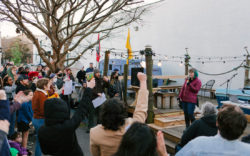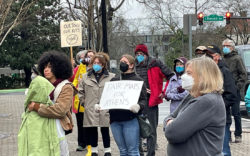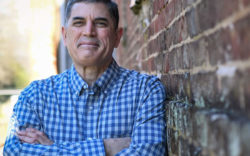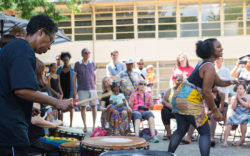After eight years of political languor during the Obama presidency, many Athens progressives found themselves organizationally naked against the harsh political winds that began blowing in on election night, and unprepared for what might come. A sudden, desperate scrambling followed, a rush to assemble structures of solidarity, activism and defense. But for Montu Miller and other members of Athens’ hip-hop activist community, the mission remains much the same as before Election Day.
“Welcome to the revolution,” says Miller, an inveterate leader in the local hip-hop community for nearly 20 years. “We’re not gonna judge you for what you did,” he says. “You fell asleep, but if you’re back now—you’re here, you’re active—then come and join us.”
Mokah Johnson echoes Miller. “We’re trying to be proactive, not reactive,” says Johnson, who, with her husband Knowa, helped lead last year’s fight for an anti-discrimination ordinance. “Right now, I’m not worried about Trump. Regardless of who’s in office, it hasn’t made much difference in the African-American community. No matter who’s in office, even Obama, we’re still suffering.”
“It wasn’t a surprise when he won,” says rapper Ishmael “Ishues” Cuthbertson, one of Athens’ hip hop’s most famous sons. He recognizes the singular danger of Trump, but he’s not surprised at Trump’s successful appeal to white fear, resentment and anger.
Following the election, these black hip-hop activists did not feel the same shock as many white liberals. It might be that Trump’s success, founded largely on racialized politics, is a surprise only to those free to live in ignorance of persistent racism. The warm safety of political hibernation remains a retreat largely reserved for white folks.
“Hip hop’s always been political,” says Miller. As a new student at UGA in 1999, Miller helped form the Dreaded Mindz Family, a seminal hub of Athens hip hop and activism. Two of hip hop’s foundational components were at work: It’s political, and it also relies on an essential sense of place. The flip side of repping your city is caring about your city.
Miller and others in Dreaded Mindz, many of them students or transplants, developed an ethos to counter the ills of a city largely at the mercy of transient students. “We refused to come into this town and just leech,” Miller says. “It was natural. Of course we wanted to make this place better while we were here.”
After many of the core Dreaded Mindz members committed themselves to Athens, the seeds planted by the group grew and flourished. Cuthbertson soon rocketed to success, touring the U.S. and Africa with his mentor, political rap icon KRS-One. In turn, Cuthbertson influenced up-and-coming Athens rappers such as Yung’N Restless, whose trenchant political rap can be seen as a direct descendant of Ishues’.
A self-described “nerdy” Eagle Scout still in high school, young Tommy Valentine (or YT, as he then called himself), started tagging along with Dreaded Mindz in 2000 and soon became a battle-rap sensation. But perhaps more importantly, his tutelage under Miller, Cuthbertson and Lemuel “Life the Griot” LaRoche set Valentine on his way to the political life he now pursues as a PhD student in public administration and policy at UGA.
Valentine was recently elected vice chairman of the Athens-Clarke County Democratic Party, and there is whispering among observers of Athens politics that he may bring what he learned from the hip-hop community to a run for local office.
Hooking up with Miller and Dreaded Mindz “began one of the most pivotal periods of mentorship in my life,” says Valentine. In addition to honing mic skills, members were encouraged to be active in catalyzing positive change. “It was very much a crash course in community organizing,” remembers Valentine, who would later apply those skills to managing a Democratic congressional candidate in 2008, Bobby Saxon. “Hip hop taught me [how] to inclusively lead a large group of people, and how to energize them behind a cause,” says Valentine.
“I’m an activist who just happens to rap a bit/ An advocate of action against the factions that trapped us here,” raps Cuthbertson on the 2007 Ishues track “ Let It Build .” In the Athens hip-hop community, the lines often blur between artist and activist, promoter and politician, rapper and radical. “I gotta live what I’m saying,” says Cuthbertson. “I have to live what I’m talking about.”
The Johnsons, who moved to Athens in 2012, quickly integrated themselves into the hip-hop scene, which meant they soon became active in local politics and activism. The two “hip-hop entrepreneurs” became “hip-hop activists,” says Mokah, when their downtown promotion business (the two founded the Athens Hip Hop Awards) melded with a burgeoning movement among students of color who claimed to have been discriminated against by clubs and bars downtown. Mokah quickly became a leader of the movement.
The movement scored a victory in early November, achieving the bulk of their demands, including an ordinance aimed at addressing racial discrimination in downtown bars and a human relations committee, the initial step toward a body dedicated to enforcing the ordinance. The victory marked an early achievement in what appears to be a political awakening in Athens, and continues the tradition set by Miller, Cuthbertson, LaRoche and others for whom the hip-hop ethos compels attention to the conditions where you live, regardless of where you’re from.
The current movement sees newcomers and students joining forces with veterans like Cuthbertson, who recently returned to the mic after years off to raise his family. “I feel obligated to come back out with new music, because times are more tumultuous now than they were when I was coming out,” he says. Valentine, once the young battle rapper, is now heavily involved in local politics. Miller continues to shepherd young rappers like Squalle, Blacknerdninja and Yung’N Restless, all artists with “conscious” dimensions to their music.
What’s still missing, though, is steady and sturdy cooperation and communication between Athens’ hip-hop activist community and white progressives, as well as between the hip-hop and rock scenes in town.
“There’s still too much separation between the white community and the black community,” says Cuthbertson. “There’s still a huge, huge separation.” Mokah describes “an invisible line” that continues to divide Athens, even its progressive community. The anti-discrimination movement demonstrated the power of cross-community alliance, and one hopes that success presages more such unions, as the next four years are sure to bring pressures to Athens that can only be met with unified effort and action.
Like what you just read? Support Flagpole by making a donation today. Every dollar you give helps fund our ongoing mission to provide Athens with quality, independent journalism.










